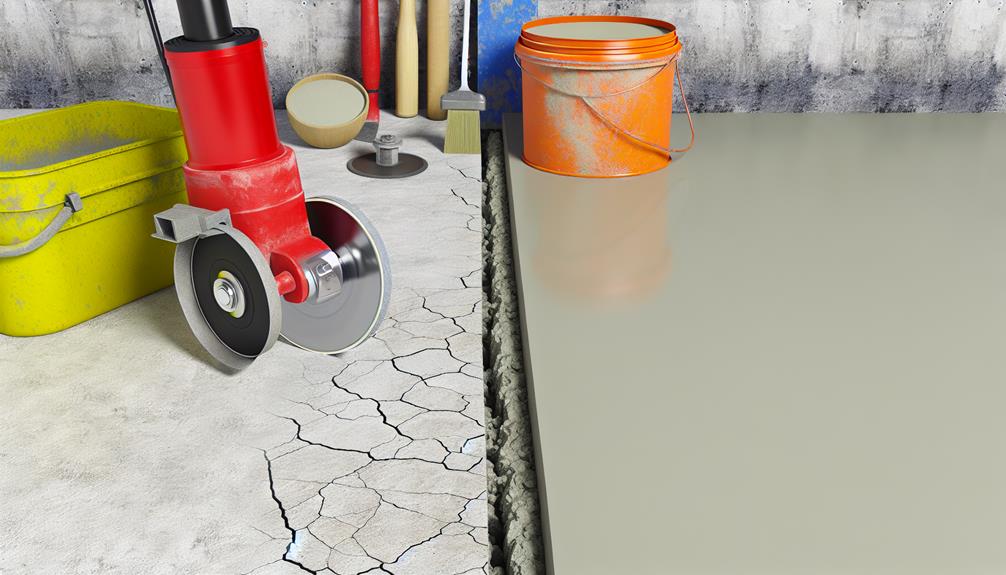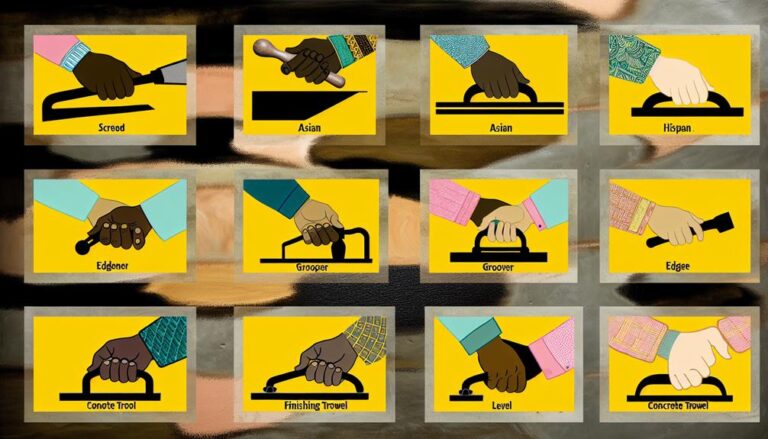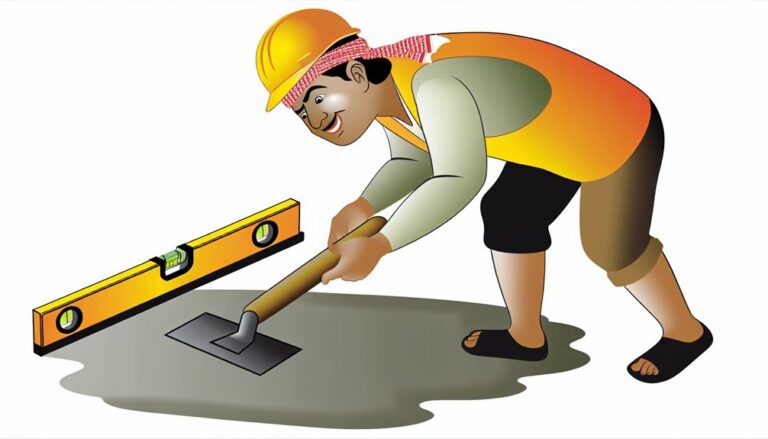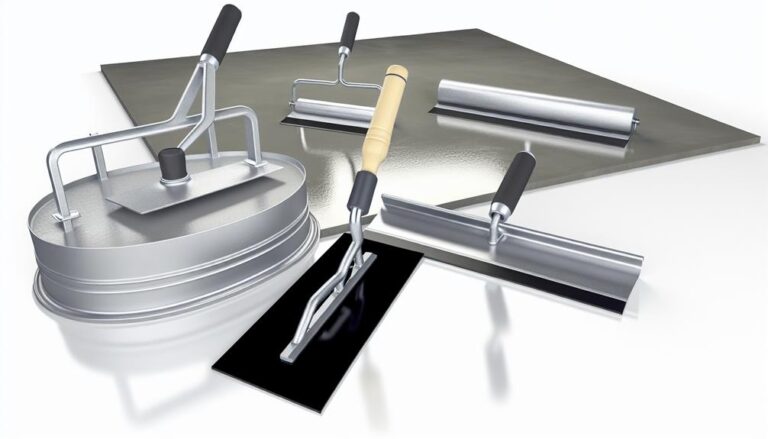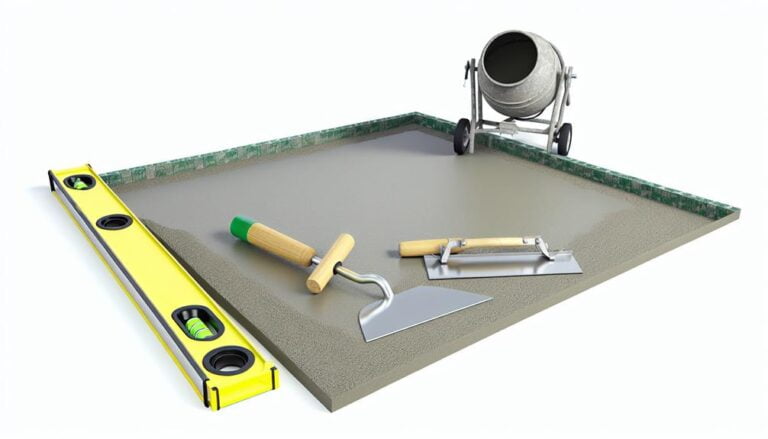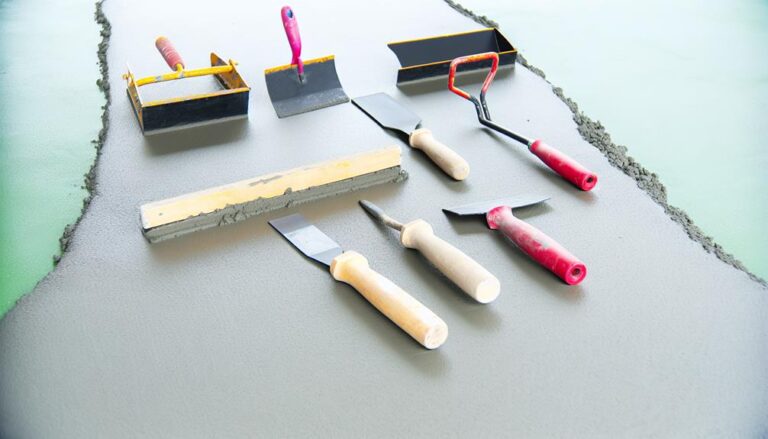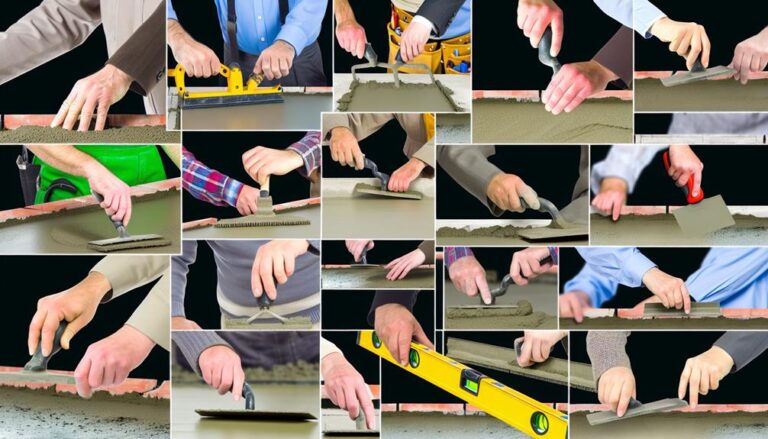Why Is Special Equipment Needed for Concrete Leveling?
Special equipment is key for concrete leveling. It ensures you achieve precision, efficiency, and safety. Machines handle heavy tasks reducing physical stress and injury risk. Accurate use of concrete also reduces waste. This equipment boosts productivity, making your projects more profitable. Tools like concrete screeds, grinders and planers, alongside protective gear like hard hats and gloves, are crucial. Using a leveling compound results in a durable, smooth finish. Laser levels and power trowels aid in accuracy and speed. Dive deeper into the world of concrete leveling, and you'll grasp the essential role of these specialized tools.
Understanding Concrete Leveling Basics
In the world of construction, understanding the basics of concrete leveling is crucial to ensure a solid and even foundation for your projects. It's not as simple as pouring concrete and hoping for the best. In fact, there's a whole science to it that you need to get your head around.
Firstly, you've got to know that concrete leveling involves altering the foundation of a structure, making it more balanced and stabilized. It's about fixing uneven concrete surfaces by altering the foundation that the surface rests upon.
You can't ignore the importance of site preparation either. Before any concrete is poured, the site must be properly prepared, compacted, and graded. Any debris, roots or rocks could cause unevenness, leading to future problems.
Moreover, the type of concrete mix and the weather conditions during the pour and curing process can greatly affect the levelness of the concrete. It's a process that requires attention to detail, patience, and knowledge.
Lastly, you must understand that concrete leveling isn't a one-size-fits-all solution. Each project might call for a different approach. That's why it's essential to know the basics, to make the right decisions when the time comes. It's a skill you'll value in any construction project.
Importance of Specialized Equipment
Often, you'll find that using specialized equipment is non-negotiable when it comes to concrete leveling. It's not just a suggestion but rather a fundamental requirement to ensure precision, efficiency, and safety.
The importance of specialized equipment can't be overstated. For one, these machines can effortlessly handle the heavy burden that comes with leveling concrete, which can be an arduous and labor-intensive task if done manually. This not only speeds up the process but also reduces the risk of physical stress and injury to the workers.
Secondly, specialized equipment ensures accuracy and consistency. These machines are designed to deliver high precision, reducing the margin of error that can result from manual work. This leads to a smoother and more level finish, which is crucial in the construction process.
Lastly, specialized equipment can significantly reduce waste. With their precision, they ensure that the exact amount of concrete is used, reducing any excess that can lead to unnecessary costs and environmental impact.
Concrete Leveling Machines: A Closer Look
Diving into the world of concrete leveling machines, it's essential to understand their key features, benefits, and how they operate. These machines are vital in ensuring that the concrete surface is flat and smooth. Let's take a closer look.
A concrete leveling machine, often referred to as a concrete screed, has a long, flat board used to smoothen the concrete. The board is dragged across the surface of the wet concrete, cutting off the excess and filling in any gaps or holes. The machine's engine vibrates the board, which helps distribute the concrete evenly.
The primary benefits include increased efficiency, reduced labor costs, and improved quality. With these machines, you're not just getting a tool; you're investing in a solution that can significantly increase the productivity and profitability of your concrete projects.
Here's a quick comparison of manual leveling and using a machine:
| Manual Leveling | Concrete Leveling Machine | |
|---|---|---|
| Efficiency | Low | High |
| Labor Costs | High | Low |
| Quality | Variable | High |
It's clear that concrete leveling machines offer substantial advantages, making them an essential piece of equipment in the field.
Role of Concrete Grinders and Planers
While concrete leveling machines ensure a smooth and flat surface, concrete grinders and planers play an equally important role in achieving the perfect finish.
You might be wondering, 'What exactly is the role of these tools in concrete leveling?' Well, once the concrete surface has been leveled, it's the grinders and planers that come into play. They're used to further smooth the concrete surface, ensuring it's not only level but also free of any imperfections.
Concrete grinders, as you may have guessed, grind down the surface of the concrete. They're typically used to eliminate any minor humps, bumps, or imperfections left by the leveling process. They can also be used to remove old paint or coatings, giving you a fresh, clean surface to work with.
On the other hand, concrete planers, also known as concrete scarifiers, are used to remove a layer of concrete, typically to prepare the surface for a new layer or coating. They're more aggressive than grinders and are ideal for dealing with more substantial surface imperfections.
The Necessity of Concrete Leveling Compound
In the world of concrete leveling, you'll find that a concrete leveling compound is a crucial tool for achieving that smooth, perfect finish. This specialized mixture is designed to fill in any dips or depressions in the concrete surface. It's a necessary component in the leveling process, and without it, you're left with uneven, bumpy concrete.
Perhaps you're wondering, 'Why can't I just pour more concrete to level the surface?' The answer is simple. Concrete is heavy and hard to work with. It doesn't flow into low spots easily and can result in a surface that's just as uneven as before. On the other hand, a leveling compound is lighter and flows easily, filling in those low spots for a perfectly level surface.
In addition, the compound also helps to strengthen the concrete. It binds with the existing surface, creating a more durable, long-lasting finish. So, not only does it help achieve that smooth, level surface you're after, but it also extends the life of your concrete. So, you can see that a concrete leveling compound isn't just helpful—it's necessary.
Use of Laser Levels in Concrete Leveling
Beyond the use of a leveling compound, you'll also find laser levels to be an invaluable tool in the concrete leveling process. These devices emit a laser beam that provides an accurate level line for your concrete job. They allow you to maintain the correct depth and flatness throughout the project, ensuring a high-quality finish.
You'll appreciate the precision that a laser level brings to your work. It's an investment that pays off by saving you time and reducing the likelihood of costly mistakes.
Check out the table below for a quick comparison of working with and without a laser level:
| Without Laser Level | With Laser Level |
|---|---|
| Guesswork and inaccuracies | High precision |
| Time-consuming adjustments | Quick and easy leveling |
| Potential for costly mistakes | Reduced risk of errors |
| Less professional results | Professional, high-quality finish |
| Greater physical strain | Less manual labor |
Safety Gear for Concrete Leveling Jobs
Having the right tools for precision isn't enough, you also need to prioritize your safety when performing concrete leveling jobs. This work can be quite risky without the appropriate safety gear.
First, you'll need a hard hat. With heavy materials and equipment operating overhead, you don't want to leave your head unprotected. Safety goggles are another must-have. They safeguard your eyes from flying debris and dust, which are common in concrete leveling tasks.
Don't overlook the importance of work gloves. They not only protect your hands from abrasions but also improve your grip on heavy tools and equipment. Similarly, steel-toed boots are essential. They provide much-needed protection from falling objects and can prevent serious foot injuries.
Lastly, a high-visibility vest is crucial when working in a busy site. It ensures other workers can see you clearly, reducing the risk of accidents.
Frequently Asked Questions
What Is the Average Cost of Concrete Leveling Using Specialized Equipment?
You're curious about the average cost of concrete leveling with specialized equipment. It's a bit tricky as costs vary widely based on the size and condition of the area.
On average, you're looking at around $500 to $1,300 for a typical residential job. Remember, this is a rough estimate. Factors like geographical location, complexity of the job, and the specific equipment used can significantly affect the final price.
It's best to get multiple quotes.
How Much Time Does It Generally Take to Level a Concrete Surface With Special Equipment?
Time is a fickle friend, isn't it? For leveling a concrete surface using special equipment, it's not just about clock time. You've got to consider the size and condition of the surface, and the type of equipment being used.
Generally, though, it might take a couple of hours to a full day. But remember, if you rush it, you might end up with a lumpy mess instead of a smooth surface. Patience is key here.
Can Concrete Leveling Be a DIY Project or Does It Always Require Professional Help?
While you could attempt concrete leveling as a DIY project, it's not recommended. This task requires specialized knowledge and equipment to ensure it's done correctly. If you don't have the right tools or expertise, you could make the problem worse.
It's best to hire a professional who understands the complexities of concrete leveling. They'll have the necessary equipment and skills to ensure the job's done right, saving you time and potential headaches.
How Often Does Concrete Need to Be Leveled?
How often you'll need to level your concrete depends on various factors. If you're noticing sinking, cracking, or uneven surfaces, it's time to consider leveling.
Factors like soil conditions, water drainage, and the quality of the initial work can impact how often this needs to be done. It's not a regular maintenance task, so you don't need to worry about it unless you notice issues.
Always consult a professional if you're unsure.
How Does Weather and Climate Affect the Concrete Leveling Process?
Weather and climate play a significant role in the concrete leveling process.
In cold temperatures, concrete can freeze and crack, impacting the leveling process.
Hot, dry climates can speed up the curing of concrete, potentially resulting in uneven surfaces.
Rainfall can wash away the leveling compound before it sets, causing issues.
Considering weather conditions is crucial for a successful concrete leveling job.
Conclusion
So, why the need for specialized gear in concrete leveling?
Well, 75% of poorly leveled concrete projects are due to improper or lack of equipment. Imagine a bumpy sidewalk, a lopsided driveway, or a sloping patio. Not an appealing sight, right? That's why concrete leveling machines, grinders, planers, and laser levels are crucial.
And don't forget the safety gear – your well-being is paramount.
It's clear, the right equipment makes all the difference in concrete leveling.
